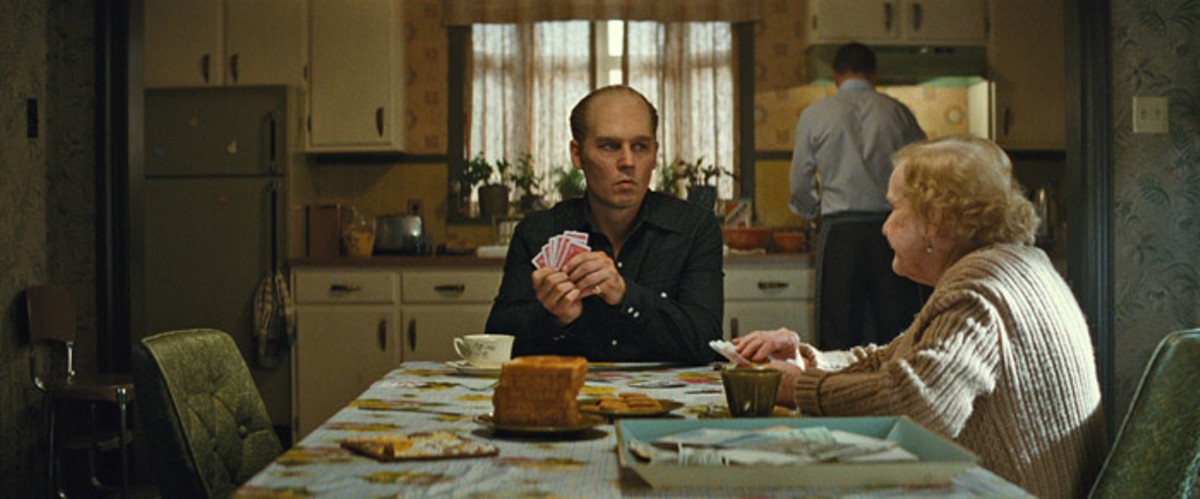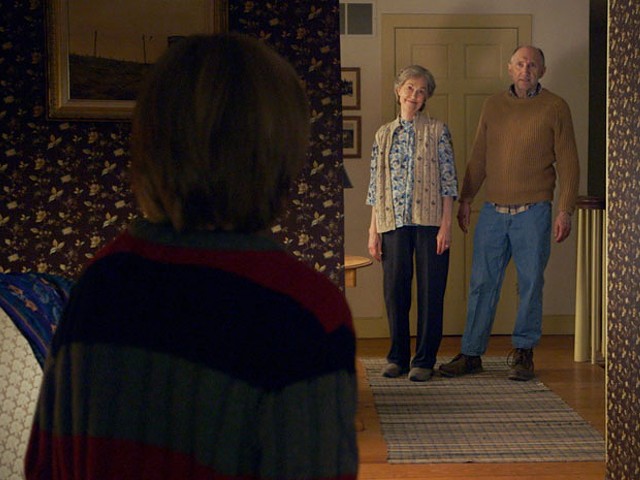The classic gangster film is almost always the story of the rise and fall of its protagonists, but even at the height of the Hays Code and its "crime does not pay" rules, the romantic rise was usually more appealing than the inevitable fall. It's a genre not about crime so much as social mobility, about seizing power and struggling for a place in the world.
The lives of real-life gangsters aren't necessarily as romantic. James "Whitey" Bulger, the subject of Black Mass, doesn't seem to have any "top of the world, Ma" dreams like James Cagney (although he lives with his mother until her death and remains in the same drab house afterward). Movie outlaws hit the road or move up into vulgar mansions; Bulger is fixed, tied to his South Boston neighborhood. If he's particularly powerful or wealthy, there's nothing in the movie to show it; he's just a disturbed and violent man with no emotion, no desire.
Although Bulger spent a dozen years on the FBI's Most Wanted list — in the No. 2 slot just behind Osama bin Laden — I suspect that many people remained unaware of his criminal history until his 2011 capture, after sixteen years in hiding. Finally brought to trial for several decades of criminal activity — extortion, racketeering and nineteen counts of murder — new revelations of his monstrous deeds began appearing almost daily. One reason for Bulger's relative anonymity, according to Black Mass, is that Bulger spent nearly two decades as an FBI informant, getting protection for his own crimes in exchange for his help in bringing down his criminal rivals.
Black Mass, directed by Scott Cooper, is a messy, confused film about Bulger (Johnny Depp) and his curious relationship with FBI special agent John Connolly (Joel Edgerton), who shared his background and, at least in the film's account, practically became his accomplice.
Or at least that's what it seems to be about much of the time. The Boston accents and settings may evoke The Departed, but there's no center here, no plot or character to push the story in any particular direction. Bulger is clearly the film's most important figure (after all, it's Johnny Depp!), but there's no insight into his personality and very little explanation of his behavior. So much of the story is structured around the (simultaneous?) confessions of two Bulger associates that he remains a supporting character at best. His descent into corruption is the closest thing the film has to a plot, but it's marginal. (The dual confessions also make a muddle of the film chronologically: When the FBI's case against Bulger finally starts to come together near the end, it takes a second for it to register that the agents have only at that moment caught on to the story the audience has been following for more than 90 minutes).
The film isn't altogether uninteresting, but even the occasional violent shocks and the benefits of a distinguished cast (Benedict Cumberbatch and Kevin Bacon are predictably appealing in supporting roles) only go so far in holding together a disjointed narrative. Even Depp's "comeback performance" as a serious actor, although not entirely without interest, suffers from inconsistency. Sometimes he's channeling Jack Nicholson (Nicholson's character in The Departed was inspired by Bulger); at other times he looks like an aging lounge lizard, or like he's auditioning for a part in What We Do in the Shadows 2. At first I thought that the erratic makeup effects and mismatched features were intentional, an indicator of Bulger's personality swings, but as the film went on, they simply became another sign of the film's random, inconsistent approach to Bulger's story.
Perhaps a headline-grabbing story like Bulger's made this a high-concept film — but unlike comic-book movies or science-fiction epics, Black Mass can reach only as high as its real-life background. There's no more insight than you might get following Bulger's trial in the news. In fact, it's almost identical to that experience: Brief, sensational incidents strung together with minimal contextualization. You can respect Cooper's desire to strip away the romance of the gangster film, but he hasn't replaced it with anything to give substance to what's left.






